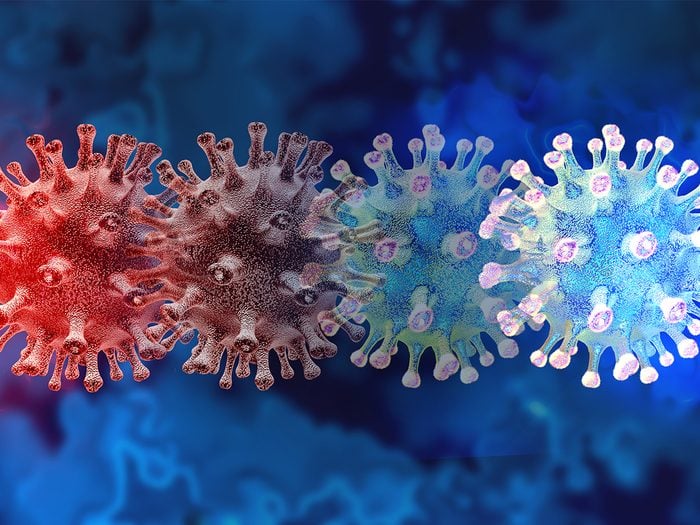What You Need to Know About COVID Variants in Canada

Canadian scientists and a clinician answer the most frequently asked questions about COVID variants, and what they mean for the end of the pandemic.
Update: On Sept. 16, Pfizer-BioNTech and Moderna vaccines received full approval from Health Canada as well as new brand names. The Pfizer-BioNTech vaccine is now “Comirnaty,” the Moderna vaccine is now “SpikeVax” and the AstraZeneca vaccine is now called “Vaxzevria.”
Another day, another variant. That’s how it can feel reading the news headlines these days—and it can be overwhelming and scary. On social media and in speaking with Canadians, we’ve heard many concerns and unanswered questions: How serious are these variants? Will the vaccines still protect us? What does it all mean for the end of the pandemic?
Here, we give some background and context to help you navigate the news about COVID variants in Canada.
What is a COVID variant?
To understand what variants are, we need to understand the basics of the infection cycle of SARS-CoV-2, the virus that leads to COVID-19. Consider this like the Coles Notes for the virus’ life story.
Viral Infection: The virus gets into our body primarily through our nose and mouth, and enters cells in our respiratory tract. The virus then uses our cells to make copies of itself. The new viruses escape from our bodies when we cough, sneeze, talk, sing, or breathe and infect other people in close proximity.
Mutations: The virus replicates inside our cells and makes copies of its own genetic material, which functions like a recipe book with instructions to make the virus’ proteins. Sometimes, mistakes are made during this process—these mistakes are called mutations. Some mutations change the recipe, resulting in proteins that look or function a little bit differently.
Variants: Virus mutations lead to variants, a modified version of the original virus. Think of these like the sequel to the original virus—the same core elements are there, but it is also an entirely new story. The likelihood of variants forming increases when there is increased transmission among people, giving the virus more opportunity to replicate which can lead to mutations.
You may have heard discussions about “variants of concern,” which right now includes the Alpha, Beta, Gamma and Delta variants (see below for more info). Variants of concern have a competitive advantage over other variants due to factors like how quickly they’re able to spread, how sick they can make a person, and their ability to overcome immunity from vaccines or resist medication. By contrast, “variants of interest” contain mutations that are suspected to offer an advantage, but the variant hasn’t yet been found to behave any differently.
The reason experts, including the World Health Organization (WHO), keep a watchful eye on variants of concern is because they can change the course of an epidemic, potentially making the virus harder to control.
(Related: Hayley Wickenheiser On What Working on the Frontlines of COVID-19 Has Been Like)
What variants are we seeing in Canada right now?
There are currently four variants of concern as defined by the (WHO) (see chart below). All four of these COVID variants have been found in Canada in varying proportions: currently, the Alpha variant remains dominant, but the Delta variant is becoming more prevalent in some regions, like Ontario.
| WHO Label | First Identified | Characteristics (compared to original virus) |
| Alpha | United Kingdom |
|
| Beta | South Africa |
|
| Gamma | Brazil |
|
| Delta | India |
|
Do COVID variants cause different symptoms?
Some variants of concern may differ in contagiousness or severity of symptoms, but the actual symptoms themselves have not changed. According to Health Canada, the most common symptoms observed in individuals infected with COVID-19 include fever, chills, cough, fatigue and muscle pain, headaches and nausea, vomiting or diarrhea.
Do Pfizer, Moderna and AstraZeneca COVID vaccines protect against variants?
The vaccines being used in Canada (Pfizer, Moderna, and AstraZeneca) all have evidence supporting their continued protection against the COVID-19 variants of concern. This means that despite the mutations in the variants, our immune system can still recognize and clear out the virus before any serious harm is caused.
One way to measure our vaccine-induced immune response against the variants is to test if certain antibodies—what are called neutralizing antibodies and produced by our immune systems after vaccination—can recognize and prevent the virus from entering our cells. Many studies (like this one and this preprint that has not yet been peer-reviewed) have found that once vaccinated, our immune systems produce more than enough antibodies to prevent the virus from infecting our cells.
To get a full picture about actual protection from disease, we need to measure vaccine effectiveness, meaning the ability of the vaccine to prevent disease. A recently published study in the New England Journal of Medicine compared the effectiveness of the Pfizer and AstraZeneca vaccines found that a single dose of either vaccine had a big drop in protection against symptomatic illness for the Delta variant (around 33 percent) compared to the Alpha variant (around 49 percent). However, two doses had similarly high protection against both variants: Pfizer was 94 percent and 88 percent effective, and AstraZeneca was 74 percent and 67 percent effective against Alpha and Delta, respectively.
The Beta variant raised concerns about overcoming our vaccine-acquired immunity when a small study from South Africa found a drop in vaccine effectiveness for the AstraZeneca vaccine. Although protection from severe illness was not measured in that study, high activation of T-cells (a branch of the immune system that kills virus-infected cells) suggests there would still be substantial protection from severe outcomes. Supporting this, a recent report from Ontario awaiting peer-review found when it comes to severe illness leading to hospitalization or death, a single dose of AstraZeneca was 83 percent effective against Beta (similar for Alpha and Delta). The study also found that Pfizer and Moderna each maintain similar levels of protection against Alpha, Beta, and Delta. This should reassure those who got a full course of the AstraZeneca vaccine, or mixed AstraZeneca with an mRNA vaccine.
(Related: Moderna vs. Pfizer: Why We’re Not Playing Favourites with COVID-19 Vaccines)
What can we do to stay safe?
Thanks to effective COVID-19 vaccines that are available across Canada, COVID-19 is now a vaccine-preventable illness for the vast majority of Canada’s population. Getting vaccinated is truly the best way to protect yourself and loved ones.
Currently, the rates of COVID-19 across Canada are the lowest they have been since July 2020; however, variants of concern may increase ease of virus spread and lead to more severe illness for some. It is important to continue to follow public health measures, where applicable, and take extra precautions to protect vulnerable populations. These include those who have not yet been vaccinated, are ineligible for vaccination (e.g. kids under 12), those who cannot be vaccinated (e.g. due to allergies) and those who might not mount a sufficient immune response to vaccination (e.g. some immune compromising conditions).
The following public health guidance is an important to protect against the virus and its variants:
- Physical distancing where possible
- Wash your hands
- Wear your mask
- Try to socialize outdoors where possible
- And of course, get vaccinated!
(Related: Here’s What You Need to Know About COVID-19 Vaccines and Infertility)
With COVID variants, will the pandemic ever really be over?
Even long after the pandemic ends, the virus is unlikely to disappear—we may still see outbreaks, and there may be a need for future vaccinations to help keep COVID under control (to avoid epidemics). The need for future vaccinations will depend on how long immunity lasts, and whether or not new variants could substantially evade our vaccine-acquired immunity. These factors will be determined in the future.
Right now our best defense against COVID-19—and COVID variants in Canada—is vaccination and following public health measures. We’re still learning about variants, but this much is clear: vaccines will bring us to the end of the pandemic faster, and save a lot of lives.
Kimberley Gauthier is a Cell Biology Research fellow in Toronto and volunteer science communicator with COVID-19 Resources Canada.
Mira Maximos is an Inpatient and Antimicrobial Stewardship Pharmacist Specializing in Infectious Diseases.
Krishana Sankar is a Cellular and Molecular Biologist and Science Communicator. She is currently the Science Advisor for Science Up First.
Next, find out what experts what you to know about COVID-19 vaccines and your period.




